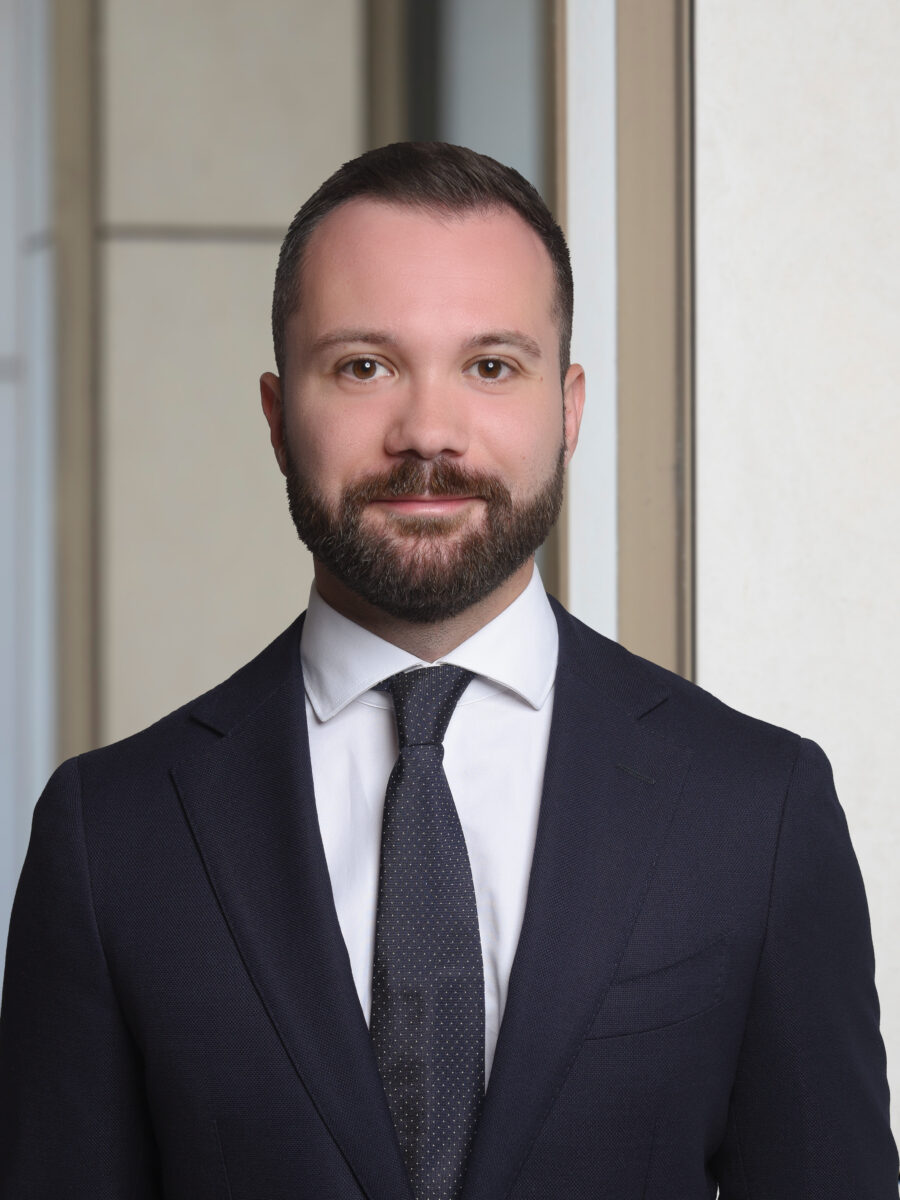Important notes
This information is a marketing communication. It is intended exclusively for clients in the »professional clients« client category pursuant to section 67(2) of the WpHG and/or »eligible counterparties« pursuant to section 67(4) of the WpHG, and is not meant for retail clients. This information and references to issuers, financial instruments or financial products do not constitute an investment strategy recommendation pursuant to Article 3 (1) No. 34 Regulation (EU) No 596/2014 on market abuse (market abuse regulation) nor an investment recommendations pursuant to Article 3 (1) No. 35 Regulation (EU) No 596/2014, both provisions in connection with section 85 (1) of the German Securities Trading Act (WpHG). As a marketing communication this document does not meet all legal requirements to warrant the objectivity of investment recommendations and investment strategy recommendations and is not subject to the ban on trading prior to the publication of investment recommendations and investment strategy recommendations. This document is intended to give you an opportunity to form your own view of an investment. However, it does not replace a legal, tax or individual financial advice. Your investment objectives and your personal and financial circumstances were not taken into account. We therefore expressly point out that this information does not constitute individual investment advice. Any products or securities described may not be available for purchase in all countries or only in certain investor categories. This information may only be distributed within the framework of applicable law and in particular not to citizens of the USA or persons resident in the USA. The statements made herein have not been audited by any external party, particularly not by an independent auditing firm. Any future returns on fund investments may be subject to taxation, which depends on the personal situation of the investor and may change in the future. Returns on investments in foreign currencies may increase or decrease due to currency fluctuations. The purchase, holding, conversion or sale of a financial instrument, as well as the use or termination of an investment service, may give rise to costs that affect the expected income. In the case of investment funds, you should always make an investment decision on the basis of the sales documents (key information document, presentation of past performance, sales prospectus, current annual, if applicable, semi- annual report), which contain detailed information on the opportunities and risks of the relevant fund. An investment decision should be based on all characteristics of the fund and not just on the sustainability-related aspects. Sustainability related disclosures can be found at www.berenberg.de/en/esg-investments. In the case of securities for which a securities prospectus is available, investment decisions should always be made on the basis of the securities prospectus, which contains detailed information on the opportunities and risks of this financial instrument, otherwise at least on the basis of the product information document. A fund investment involves the purchase of shares in an investment fund, but not a specific underlying asset (e.g. shares in a company) held by that fund. The fund is subject to increased volatility as a result of its composition/the techniques used by Fund management; therefore, unit prices may increase or decrease significantly within short periods of time. All the aforementioned documents can be obtained from Joh. Berenberg, Gossler & Co. KG (Berenberg), Neuer Jungfernstieg 20, 20354 Hamburg, Germany, free of charge. The fund sales documents and the product information sheets for other securities are available via a download portal using the password »berenberg« at the Internet address https://docman.vwd.com/portal/berenberg/index.html. The sales documents of the funds can also be requested from the respective investment management company. We will be pleased to provide you with the specific address details upon request. A summary of your investor rights in English can be found at Investor-rights (https://www.universal-investment.com/en/Corporate/Compliance/investor-rights/), (https://www.universal-investment.com/en/Corporate/Compliance/investor-rights-UII/).In addition, we would like to point out that Universal-Investment may, in the case of funds for which it has made arrangements as management company for the distribution of fund units in other EU member states, decide to cancel these arrangements in accordance with Article 93a of Directive 2009/65/EC and Article 32a of Directive 2011/61/EU, i.e. in particular by making a blanket offer to repurchase or redeem all corresponding units held by investors in the relevant member state. The statements contained in this document are based either on own company sources or on publicly accessible third-party sources, and reflect the status of information as of the date of preparation of the presentation stated below. Subsequent changes cannot be taken into account in this document. The information given can become incorrect due to the passage of time and/or as a result of legal, political, economic or other changes. We do not assume responsibility to indicate such changes and/or to publish an updated document. Please refer to the online glossary at https://www.berenberg.de/en/glossary/ for definitions of the technical terms used in this document.
Benchmark
Information has been obtained from sources believed to be reliable but J.P. Morgan does not warrant its completeness or accuracy. The Index is used with permission. The Index may not be copied, used, or distributed without J.P. Morgan's prior written approval. Copyright 202[5], J.P. Morgan Chase & Co. All rights reserved.
https://www.berenberg.de/en/legal-notice/license-notice/
https://www.berenberg.de/rechtliche-hinweise/lizenzhinweise/
Sector Allocation by GiCS
The Global Industry Classification Standard ("GICS") was developed by and is the exclusive property and a service mark of MSCI Inc. ("MSCI") and Standard & Poor's, a division of the McGraw-Hill Companies, Inc. ("S&P") and is licensed for use by Joh. Berenberg, Gossler & Co. KG. Neither MSCI, S&P nor any third party involved in making or compiling the GICS or any GICS classifications makes any express or implied warranties or representations with respect to such standard or classification (or the results to be obtained by the use thereof), and all such parties hereby expressly disclaim all warranties of originality, accuracy, completeness, merchantability and fitness for a particular purpose with respect to any of such standard or classification. Without limiting any of the foregoing, in no event shall MSCI, S&P, any of their affiliates or any third party involved in making or compiling the GICS or any GICS classifications have any liability for any direct, indirect, special, punitive, consequential or any other damages (including lost profits) even if notified of the possibility of such damages.
Investors outside of Germany
The fund’s domicile is Luxembourg. The fund is qualified for distribution to non-qualified investors in Switzerland. The paying agent in Switzerland is Tellco AG, Bahnhofstrasse 4, CH-6430 Schwyz and the representative is 1741 Fund Solutions AG, Burggraben 16, 9000 St. Gallen, Switzerland. The prospectus including the general and specific terms, the key investor information document (KIID) as well as the annual and semi-annual report of the fund may be obtained free of charge and in German language from the aforementioned representative (Phone +41 58 458 48 00). For shares distributed in or from Switzerland place of execution and jurisdiction is at the representative’s registered office.
For investors in Brazil: The shares in the fund may not be offered or sold to the public in Brazil. Accordingly, the shares in the fund have not been nor will be registered with the Brazilian Securities Commission - CVM nor have they been submitted to the foregoing agency for approval. Documents relating to the shares in the fund, as well as the information contained therein, may not be supplied to the public in Brazil, as the offering of shares in the fund is not a public offering of securities in Brazil, nor used in connection with any offer for subscription or sale of securities to the public in Brazil.
© 2025 Morningstar
All Rights Reserved. The information contained herein: (1) is proprietary to Morningstar; (2) may not be copied or distributed; and (3) is not warranted to be accurate, complete or timely. Neither Morningstar nor its content providers are responsible for any damages or losses arising from any use of this information. Past performance is no guarantee of future results.





